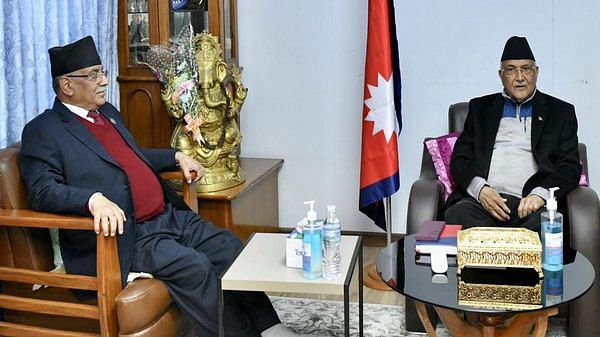On Sunday in Nepal, former Communist comrades-turned-bitter political foes-turned-allies again joined hands to lead a new government, with master political puppeteer and former prime minister K.P. Sharma Oli agreeing to support Maoist leader Pushpa Kamal Dahal in the race to become the Himalayan republic’s newest prime minister.
Oli’s move stunned Nepal as well as the neighbourhood, but Indian Prime Minister Narendra Modi recovered well and became the first international leader to congratulate Dahal, better known by his alias Prachanda. The US and Pakistan have since followed suit.
Since no political party got a majority in the recently held elections in Nepal, it was widely believed that the pre-poll political arrangement led by Nepali Congress’ Sher Bahadur Deuba – in which Prachanda was a key ally – would pull off the match.
But few had reckoned with Oli. He fought the election in opposition to Deuba and the Nepali Congress. His own differences with Prachanda are well known – in 2021, Prachanda quit the alliance with Oli because the latter didn’t make him prime minister as he had promised.
Well, Oli now seems to have had the last laugh. He promised Prachanda PM-ship for the first half of the five-year term as well as one deputy PM post out of three. Oli’s party, the United Marxist-Leninist (UML), will claim the post of the Speaker as well as the President. (The current President, Bidya Bhandari, who accepted Prachanda’s claim to be PM on Sunday, is also a former member of Oli’s party.)
Deuba, supported by New Delhi in this gamble for power, has lost. He thought he could outsmart Prachanda – and so he refused his request to become PM for the first half of the five-year term, but agreed to let him be PM for the second half of the term. Clearly, Prachanda had greater ambitions. Now Deuba has to eat humble pie.
Oli, who knew he wouldn’t have become PM if Deuba-Prachanda had shared the spoils for the next five years, decided to humiliate Deuba. He has properly succeeded in doing so.
So, why did Deuba fall out with Prachanda, his pre-poll partner? How did Oli succeed in persuading Prachanda to dump Deuba and join him?
In the end, it all boiled down to who could charm Prachanda better and tap into his soaring ambition to become PM.
Few know that Deuba, until the last minute, was also trying to get Oli to support him for PM-ship. But it didn’t work because Oli was trying to get Prachanda to become PM – so he could become king-maker and rule Nepal from behind Prachanda’s chair.
Also read: Politics in Nepal has tilted in India’s favour now. 2017 elections was all about China
China’s advantage?
Some analysts are contextualising this power play in Kathmandu as India’s loss and China’s gain. There is certainly a grain of truth in that analysis.
The Chinese would have certainly pulled out all the stops when they realised that they had a glimmer of a chance to get the Communist comrades back together – like they had done in 2018. At the time, Oli had become PM and had promised Prachanda that he would hand over the PM’s chair to him after two-and-a-half years.
Except that he didn’t. So, Prachanda quit Oli’s team and began to support Deuba’s team.
The Chinese are believed to have been quite upset with that turn of events. Obviously, they didn’t give up trying. The visit of China’s vice minister for culture Li Qun to Kathmandu days before the election – which Deuba was unhappy about – in retrospect seems to have been about making another attempt at reunification of the Communists.
A reunification of the several Communist parties hasn’t come about today, but the second best thing has happened – the Communist parties have allied with each other, even if it is for the moment.
So, does this mean that the Chinese have won and India has lost in Nepal? Nothing, of course, is as simplistic as that. The India-Nepal relationship is a deep-rooted one and can never be challenged by any other, including China. All Nepal’s rivers flow south. The open border is a model for the rest of South Asia. Nepal’s Terai and the neighbouring states of Uttar Pradesh and Bihar enjoy a “roti-beti ka rishta”.
Prachanda has one month to prove his confidence on the floor of the House. A lot can happen in one month.
But the real surprise of this election result is not that Prachanda is the new, surprise PM or that Oli has pulled off a coup against Deuba or that China seems to be smiling across the Himalayas – but that Rabi Lamichhane, president of the Rashtriya Swatantra Party, akin to India’s Aam Aadmi Party, has gone and joined the Oli-Prachanda-led coalition.
A former TV journalist, Lamichhane will be one of three deputy prime ministers, proof that Nepal’s new generation of politicians fully understand the struggle for power. The fact that his party, full of Young Turks, was able to defeat some established names in Nepal’s political establishment, speaks volumes of their determination to bring change to the system.
And now for Prachanda’s turn in the PM’s chair. This will be his third time. It promises to be an interesting two-and-a-half years, with India watching carefully every step.
The author is a consulting editor. She tweets @jomalhotra. Views are personal.
(Edited by Prashant)



